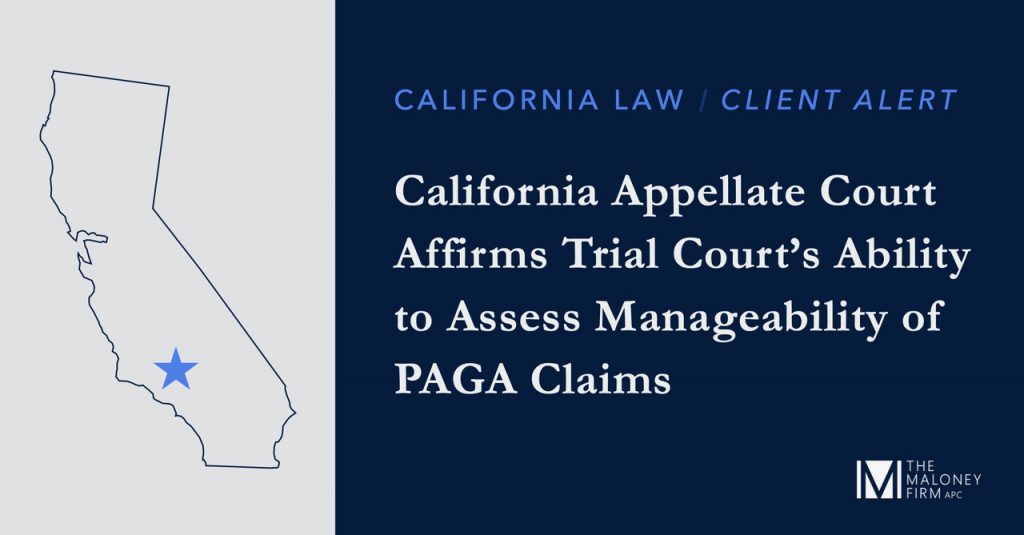California Appellate Court Affirms Trial Court’s Ability to Assess Manageability of PAGA Claims
Sep 15, 2021By Lisa Von Eschen, Esq., The Maloney Firm, APC

On September 9, 2021, a California Court of Appeal in Wesson v. Staples, Cal. App. 5th (Cal. App., Sept. 9, 2021) affirmed the lower court’s decision striking the alleged PAGA claims, holding that “trial courts have inherent authority to ensure that PAGA claims will be manageable at trial, and to strike such claims if they cannot be managed.”
.
Context
.
The Private Attorneys General Act (PAGA) enables employees to file lawsuits on behalf of themselves, other employees, and the State of California for Labor Code violations. In 2009, the California Supreme Court ruled that PAGA actions are not subject to the same rigorous certification procedure required for bringing class action suits.
.
Instead, for a representative PAGA claim to advance to trial, it must be “manageable,” or subject to a form of “common proof,” in order to protect the allegedly infringing employer’s right to due process. A PAGA claim’s manageability comes into question when individualized inquiries for a large number of employees are required to determine whether any Labor Code violations have been committed.
.
The Issue
.
In Wesson v. Staples, Wesson filed a representative PAGA claim alleging that Staples had misclassified himself and 345 other former and current store general managers (GM’s) as exempt executives. Staples moved to strike Wesson’s claim, arguing that litigating their affirmative defense that each GM was properly classified would be unmanageable, as Staples would need to conduct individualized investigations and present proof at trial for each GM.
.
The trial court invited Wesson to create a trial plan demonstrating the manageability of his claim. During a subsequent hearing on Staples’ motion, the parties estimated that it would take eight years—six trial days per each of 346 GMs—to litigate Staples’ defense. After Wesson continually insisted that the court lacked the authority to ensure PAGA actions are manageable, and failed to address how to manageably litigate Staples’ affirmative defense, the court granted Staples’ motion to strike the PAGA claim.
.
The Appellate Court’s Decision
.
In its decision, the California Court of Appeal affirmed the trial court’s ruling, concluding that:
(1) courts have inherent authority to ensure that PAGA claims can be fairly and efficiently tried and, if necessary, may strike claims that cannot be rendered manageable; (2) as a matter of due process, defendants are entitled to a fair opportunity to litigate available affirmative defenses, and a court’s manageability assessment should account for them; and (3) given the state of the record and Wesson’s lack of cooperation with the trial court’s manageability inquiry, the court did not abuse its discretion in striking his PAGA claim as unmanageable.
Staples presented evidence, which Wesson did not contest on appeal, that the significant variation in Staples GMs’ work experiences would require ‘individualized assessments of each GM’s classification and would lead to “an unmanageable mess” that “would waste the time and resources of the Court and the parties.”’ As the trial court was not presented with any “apparent way to litigate Staples’s affirmative defense in a fair and expeditious manner,” the appellate court affirmed that “the trial court did not abuse its discretion in striking Wesson’s claim as unmanageable.”
.
Nonetheless, the appellate court asserted that PAGA claims will not always be struck if they are found to be unmanageable, and that courts “should work with the parties to render a PAGA claim manageable by adopting a feasible trial plan or limiting the claim’s scope.” The appellate court further clarified that it did “not hold that a PAGA misclassification case can never be managed through common-proof methods,” but that “Wesson’s lack of cooperation with the trial court’s inquiry in this regard stymied the court’s efforts to devise a plan that would allow the action to proceed.”
.
The Takeaway
.
Wesson is the first California appellate decision to acknowledge a trial court’s ability to dismiss unmanageable PAGA claims, but its application may be somewhat limited by its facts. Although it recognized the trial court’s interest in ensuring an efficient and fair trial, the Court of Appeal did not provide guidance or factors for determining which PAGA claims – short of those that would take eight years in trial – are not manageable.
.
The court also did not address whether plaintiffs bear the burden to prove manageability (as in class actions), or if defendants must prove unmanageability. While Wesson is not an open door to dismissal of representative PAGA actions, a trial court’s ability to assess manageability may help employers reduce the breadth of potential claims as well as supply defensive strategies and settlement leverage.
.
If you have questions regarding this article, please contact one of the following attorneys in The Maloney Firm’s Employment Law Department: Patrick Maloney, Lisa Von Eschen, Samantha Botros, or Nicholas Grether.



